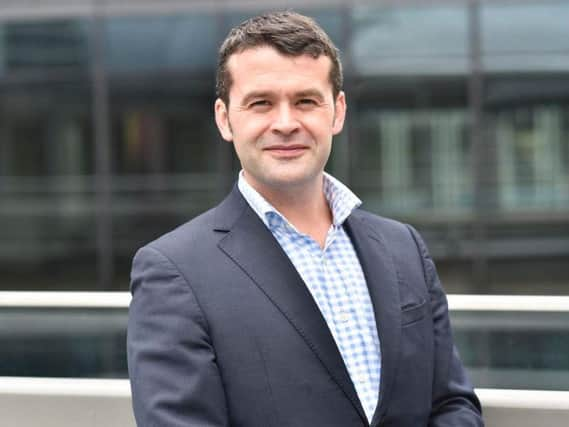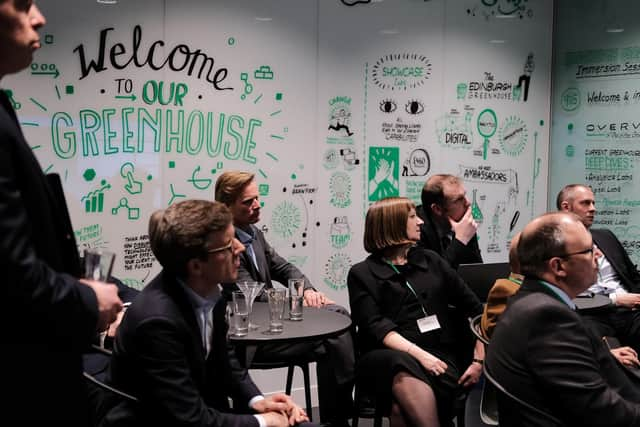Bright space for solutions to take root and grow


Ideas incubator: Deloitte uses the Edinburgh Greenhouse to take people out of their everyday environment to spark creativity and find solutions.
Throwing open the glass-panelled door, Kent Mackenzie leads the way into a corner room on the top floor of Deloitte’s Saltire Court offices in Edinburgh, with its dramatic view of the castle across the road.
Advertisement
Hide AdAdvertisement
Hide Ad“Welcome to the Greenhouse,” he says with a flourish. It’s not what you’d expect from an accountancy firm.


With brightly-colour chairs, whiteboards and break-out spaces, it looks more like a science education centre than the realm of tax advisers and corporate financiers.
Mackenzie is quick to point out: “Describing Deloitte as an audit and accountancy firm, is like calling Amazon a bookseller – of course we do audit and accountancy exceptionally well – like Amazon and its books – but we also do a whole lot more.”
He explains how the firm and its clients use the Edinburgh Greenhouse and its counterparts in other parts of the world to take people out of their everyday environments and come together to solve problems, sparking their creativity and allowing them to think about how disruptive technology can help them address everything from age-old challenges in the business, to grappling existential questions about the future of the industry and the role of technology.
With virtual reality goggles and a 3D printer on hand, participants can take their ideas further than scribbling notes on a whiteboard by starting to develop prototypes and work through how they come to life in their business.


The Greenhouse is just the tip of the iceberg though; it’s the public face of what’s going on behind the scenes.
Mackenzie is the director of a 15-strong team (“hand-picked and all with an incredible skill”) that is developing its own fintech solutions.
The team is also forming partnerships with start-up companies to work together on creating customer-facing solutions and smart technology that can reduce cost, automate decision-making, or analyse large swathes of data in far more intuitive ways.
Advertisement
Hide AdAdvertisement
Hide AdMackenzie is fresh back from Glasgow, where he’s been quizzed by auditors about how the latest fintech products and services work, and talking about how one gets to grips with the range of emerging solutions that come under the fintech banner.
If auditors are getting interested in fintech it shows how seriously the sector is being taken by the wider business community.
“People often ask me what makes me so interested in fintech,” says Mackenzie. “One could always argue that it has been around for years.
“But I think there are three reasons why it’s important now, and why we have a once-in-a-career opportunity to explore how new technologies can address market failures in financial services and create a more financially inclusive world.
“The first is regulation – with the introduction of the Second Payment Services Directive and open banking.
“The second is customer sentiment – consumers want to be able to access services at any time and in any place,” says Mackenzie.
“The third is the exponential growth in technology.
“Together, those three elements mean that there’s a great opportunity for fintech to thrive.” Closer to home Mackenzie is passionate about the opportunity Scotland has to burst on to the stage.
Indeed some of this work is well underway in the Fintech Scotland strategy he has been working with Scottish Financial Enterprise and Scottish Enterprise to develop and deliver.
Advertisement
Hide AdAdvertisement
Hide AdLast year, Mackenzie and his Deloitte team were commissioned by Scottish Enterprise to compile a report into how the nation could be turned into an international fintech hub. The 100-page study that was published last May.
Its recommendations included creating a physical hub at which events could be held and people from different backgrounds – from programmers and developers through to bankers and insurers – could meet and increase the number of “collisions” for new ideas to be developed, just as Bill Gates described during the early days of Microsoft.
His other suggestions included protecting the stream of talent that Scotland already has in the tech sector by working with teachers in secondary schools to encourage pupils to consider careers in fintech.
He also wants to find ways to bring the under-represented – such as women, parents returning to the workforce, experts and revolutionaries in remote parts of the country – to the centre of fintech.
Mackenzie talks about Scotland’s first “datathon”, which Deloitte held in March as part of the Data Lab’s DataFest17.
He spoke there to pupils who had become engrossed in technology and have “incredible” ideas about what financial services of the future could, and should, look like.
“We also need to be a bit ‘less Scottish’ when it comes to promoting ourselves,” says Mackenzie adding he was born in Jedburgh and so he is allowed to say this.
“We have world-class universities in Scotland, exceptional and well-established technology talent and our financial services industry has a long track-record of innovation – we invented the automated telling machine (ATM) – we should be pointing out that we are the original fintech pioneers.
Advertisement
Hide AdAdvertisement
Hide Ad“We need a Liam Gallagher for the fintech sector – someone who will make some noise and shout about our potential.”
Alongside his core advisory business and product development venture, playing a part in the wider fintech ecosystem is an important part of the work being undertaken by Mackenzie and his team.
Two of the most exciting areas of the firm’s work involve creating its own products and services in house and working with start-up companies to co-develop technology.
Examples of the in-house work including using artificial intelligence (AI) and cognitive analytics.
“We’re testing some specific AI initiatives with two of our biggest financial services clients at the moment.
”It’s very exciting: the potential use of AI to augment decision-making in financial services is huge.
“Our work is considering customer sentiment and how AI can be used to truly understand the ‘heartbeat’ of customers and configure services and products that will work for them, adapting to respond to the different challenges or financial ‘rhythm’ of their everyday lives.
“We are also embarking on pilots to look at how lending and affordability can be fine-tuned and more appropriately assessed using AI.
Advertisement
Hide AdAdvertisement
Hide Ad“I am very keen to focus on how we use AI for ‘good’ in financial services – it’s all about the customer.
“The next step is to use AI to make predictions instead of simply modelling past data.
“Imagine being able to make dynamic predictions about what insurance or investment products a customer might need, hour by hour, day by day, and then offering them to customer in really consumable formats.”
Mackenzie is equally as excited about the collaborations that are taking place.
“We’ve worked with James Varga and the ID Co to develop bolt-on services that help give users different perspectives on the data it has gathered,” he explains.
“The ID Co helps customers by creating a digital identity based on their banking persona, that can then be used to confirm identity when changing banks accounts, or applying for other services where proof of ID is required.
“What I love about the ID Co is the simplicity and applicability of the solution – the whole challenge of ‘identity’ in the financial services market is huge.”
Working in fintech has meant assembling a team that brings together skills not normally found in an accountancy firm.
Advertisement
Hide AdAdvertisement
Hide AdSo, why is one of the “big four” consultancies getting this excited about fintech, which is often seen as the preserve of the banks or tech start-ups?
“In my view you need three things to succeed in fintech – access to market, technology skills and an understanding and experience of the problem you’re trying to solve,” Mackenzie explains.
“There aren’t many tech start-ups that have all three, but as a firm we have all three of those – so why wouldn’t we create technology based on the skills we have in house?
“The beauty of it is that sometimes it is not quite as easy as that and I love the projects where we work with start-ups and our clients to do something together.
“We get in a room, share the problem, shake each other’s hand and agree to share the IP, and then get to work on creating something really cool – and in classic Jonathon Ive style we try not to come out of the room until we’ve created a blueprint.”
One of the areas in which Mackenzie thinks fintech can make a real difference to people’s lives is by making the world of finance more inclusive.
“Financial inclusion is often wrongly caricatured as extending capitalism and creating more consumers – but that’s not it at all,” he says.
“In this country an estimated two million people don’t have a bank account, and therefore often simply can’t get access to the welfare they need to support themselves and their families.
Advertisement
Hide AdAdvertisement
Hide Ad“The lack of financial inclusion has a huge societal impact.
“Sixty-five per cent of people in the UK don’t have enough in savings to last them two months if they lost their job, or had an accident, or had to take leave from their employment.
“By creating even small improvements in financial education people could create more financial security for themselves.”
Mackenzie adds: “There is a huge amount to think about in how fintech can help address some of the most existential questions around how we create a more financially inclusive world.
“When I dream about fintech futures, I wonder if Scotland can not only become a fintech super-power, but also take the lead in looking at how we use fintech to solve some of society’s challenges with financial services.”
For more information visit Deloitte.